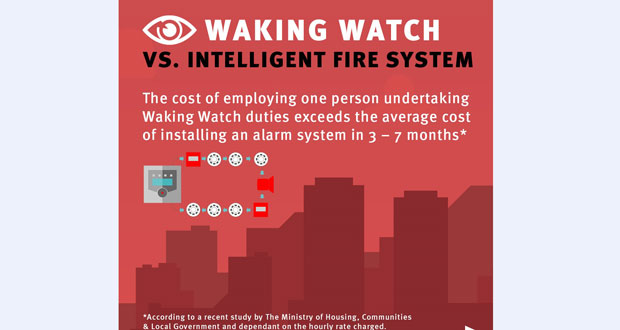Hochiki Europe is calling for a review of the uptake of ‘Waking Watches’ within the residential sector. The leading life safety product manufacturer argues that local authorities and building owners should instead focus more on incorporating intelligent fire detection into at-risk properties.
Waking watches were introduced by the National Fire Chiefs Council as a temporary measure to keep residents safe in buildings with uncompliant cladding. The process involves having trained fire wardens present on site 24/7 to monitor the building’s interior and exterior, raising an alarm in the event of a fire and assisting in the evacuation of residents. Three years after the Grenfell Tower tragedy, hundreds of buildings across the UK still have 24-hour safety patrols in place, collectively costing building owners millions of pounds every month. In some instances, the majority of these costs are being passed on to leaseholders.
The National Fire Chiefs Council has recently updated its guidance, advising that building owners should move to install fire alarm systems as quickly as possible to remove the need for Waking Watches.
In addition to lending its support to this updated guidance, Hochiki Europe is further advocating for the use of hybrid wireless fire detection systems. When installed as a temporary solution while cladding issues are resolved, these systems provide a safe and more cost-effective fire safety alternative for building owners and residents.
Paul Adams, Marketing Manager, at Hochiki Europe explains: “Not only is it safer and more reliable to install a temporary, intelligent fire detection system in cases where cladding is being examined and replaced, it is also much more cost-effective. According to a recent study by The Ministry of Housing, Communities & Local Government, the cost of employing one person undertaking Waking Watch duties exceeds the average cost of installing an alarm system in just 3 to 7 months.”
The National Fire Chiefs Council has publicly advised that an appropriate system of this kind will generally provide more certainty that a fire will be detected and warned at the earliest opportunity rather than having to rely on staff.
Adams continues: “These wireless systems, such as our Ekho hybrid range, can be easily installed and uninstalled without requiring cabling, minimising disruption to residents. They also operate on a robust, fast response intelligent radio link offering 24/7 monitoring and reporting, and can be maintained from one location within the building.”
To find out more information about how temporary fire detection can act as a viable alternative to Waking Watches throughout the cladding crisis, visit: hochikieurope.com/wakingwatch.
-ends-
To have your industry news published in the pages of FMJ’s news section, Month in FM, and here online on fmj.co.uk, please send your news and image to Danny Grange danny.grange@kpmmedia.co.uk
The view or information contained within these unedited press releases, are that of the company producing it and not necessary the views of kpm.





